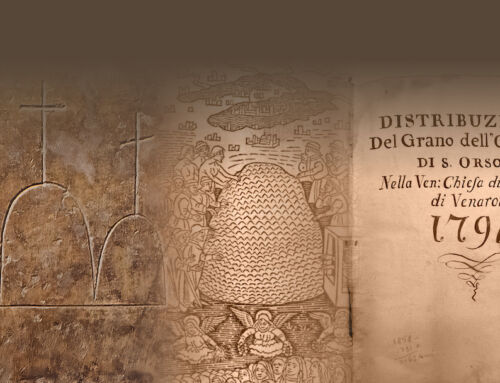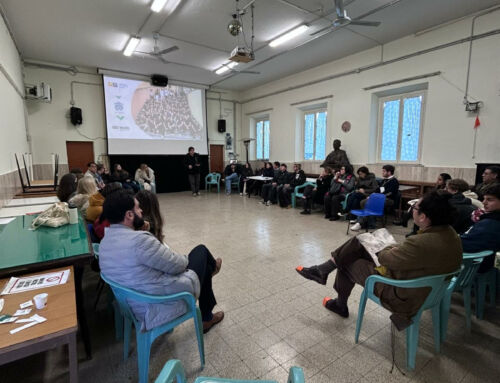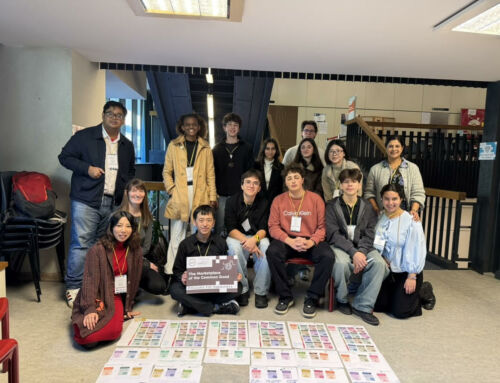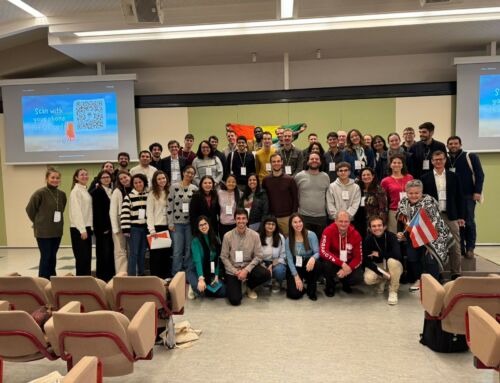Visit to the Dicastery for Promoting Integral Human Development
After receiving the Pope’s mandate, a delegation from the Foundation composed of young economists and entrepreneurs from various parts of the world visited the DSSUI.
from www.humandevelopment.va, Sept. 27th, 2024
On 23 September 2024, the Economy of Francis Foundation was officially established under the direction and inspiration of Pope Francis. The Foundation, which will operate in three main areas of intervention: research-study, business-innovation, education-culture, will be accompanied by the Dicastery for Promoting Integral Human Development (DPIHD) at the behest of the Holy Father.
After receiving the Pope’s mandate, a delegation from the Foundation composed of young economists and entrepreneurs from various parts of the world visited the DSSUI*. They were received by the Prefect, Card. Michael Czerny, and the Secretary, Sister Alessandra Smerilli. The group was accompanied by Dr Luigino Bruni who, together with the Bishop of Assisi, Mgr Domenico Sorrentino, and Dr Francesca Di Maolo, is a member of Francis’ Committee on the Economy.
Cardinal Czerny addressed the young people thanking them for “who you are, what you are and what you promise”. He encouraged them to continue to share the great successes of recent years “because the Church and the world are in great need of good news about the future, the economy and human development” and asked them not to lose their creativity, typical of young people, now that they are part of a structure such as the Foundation. Smerilli also urged those present to continue their mission in synergy with the Dicastery because, she said, “we need to collaborate with people like you who come from different countries to help us listen and get closer to the realities of the local communities”. (…) READ MORE
—
*On this occasion, Maria Jordet, an active EoF member and researcher in the EoF Academy, spoke about her experiences and the latest EoF activities on behalf of the entire community. Here is her speech:
‘Dear Friends, I am writing to invite you to take part in an initiative very close to my heart.’
This is the very first sentence in the open letter that Pope Francis sent out in May 2019 – addressed to Young Economists and Entrepreneurs worldwide. Perhaps it is because this initiative was so close to his heart that this letter had such a compelling force to call and move us participants from all continents…? We are many who felt personally and powerfully called to take part in this movement.
I remember sitting in the back seat of a car in a traffic jam outside Kolkata, India when I read the letter on my phone and knew with a fast-beating heart that I would do all that I could to take part in this initiative – even if I was not, strictly speaking, in the category of being either an Economist or Entrepreneur!
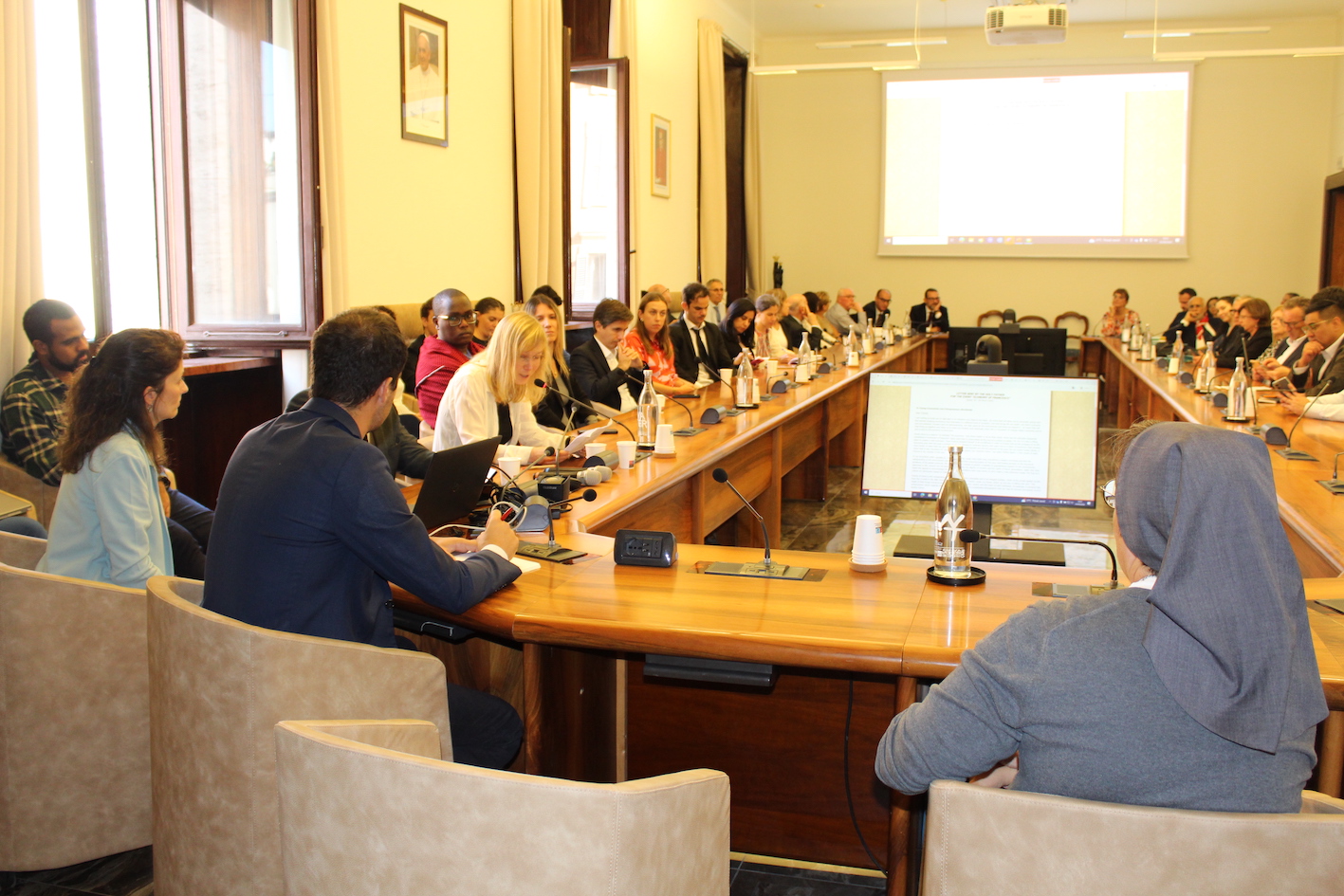
Thanks to open-minded and generous people in the staff it became possible for me to join – and this brings me to the very first characteristic I would like to draw attention to about the EoF today:
Namely that it consists of participants from very diverse backgrounds – in terms of professions, faiths and cultures – without compromising the clear focus and direction towards the overall goal of changing the economy, inspired not least by Saint Francis and the Franciscan tradition!
Secondly, EoF is unique in bridging academia, faith and practical initiatives in very creative and concrete ways, such as through call for actions, workshops with schools and educational kit for teachers, collective performances, reading marathons, digital encounters and much more.
It is certainly not an easy task to summarize the EoF within ten minutes…and I cannot possibly do justice to all the many ongoing initiatives! So, when I today lift up a few, please keep in mind that there are many other projects worth dedicating attention to!
Let’s take a further look of some of the initiatives.
The beginning of EoF – a virtual event and twelve villages
The EoF community emerged during a time of crisis, underscored by the Covid-19 pandemic causing the delay of and eventual online hosting of our event in Assisi. Nonetheless… the event turned into a collaborative platform for developing ideas, leading to the creation of twelve thematic ‘villages’ or work-groups: ‘Policies for Happiness’, ‘Energy and Poverty’, ‘Life and Life-style’, ‘Business and Peace’, ‘Women for Economy’, ‘Business in Transition’, ‘Work and Care’, ‘CO2 of Inequalities’, ‘Management and Gift’, ‘Vocation and Profit’, ‘Finance and Humanity’, ‘Agriculture and Justice’.
Each of these villages are collaborating and creating remarkable projects “on the ground” – one of these is The Farm of Francesco educating farmers and local communities in regenerative agriculture and supporting their transitions to these practices on the land where they work. There are also many other wonderful entrepreneurial projects, such as the Pacar school in Zambia aiming at elevating the level of technological schooling to empower youths; or the Profitpodquest, to mention only some!
Today there is approximately 50 hubs around the world where young people engage in entrepreneurial, social, educational projects involving local communities.
The EoF Academy and the Summer Schools
In 2021 The EoF Academy was established: an international network for young scholars, to promote and conduct scientific research related to the Economy of Francesco. The Academy supports young scholars in exploring relevant and interdisciplinary research, offering educational activities, and providing fellowship grants. Each scholar is supported by a senior Fellow who mentors them. Last year there were around 50 research fellows who were selected to develop their projects in the Academy.
The EoF Academy also offers an annual international Summer School with research and dialogue-oriented lectures from leading experts in economic fields, including for example Joseph Stiglitz. The first EoF Summer School was organized in August 2021: For many of us this was the first time to meet in person after countless hours of digital meetings in the pandemic. And what could possibly have been a better place to meet than in the ancient and beautiful city of Gubbio? Topic: “Economics in the Age of the Commons: We, the Commons.”
The second EoF Summer School was hosted by the Franciscan Sanctuary La Verna – exploring Spiritual, Social, and Narrative capitals: Going beyond capitalism. These summer schools are generative platforms for encounters, leading to the creation of new ones – also locally organized summer schools in Brazil and Mexico.
Some of us have just returned from this year’s summer school in La Verna, titled: “Homo Mendicans: Companionship, Wandering, and the pursuit of Joy”
New projects emerging…
The concept of Narrative capital – underlining the potential of stories to influence behaviours, consumption patterns, and entrepreneurial visions – also inspired a writing retreat in Norway, in June 2024: “Wondering and Wandering: Writing paths towards a new economy”.
The Griot explored this topic further in a one-week workshop-based course in Loppiano: What stories do we need today to face micro and macroeconomic challenges? How can narratives respond to the challenges of the dominant economic system?
Of course, it was a milestone for us to finally meet Pope Francis in person in Assisi in 2022 – on the fourth global event – to sign the pact that he had invited us to make. There he also reminded us of the importance of repairing damage. It resonated very much with us. On the occasion of this event, an attempt had been made to repair the language of economics: an anthology that re-examined relevant concepts in economic discourse: The Economy of Francesco Glossary – now available on three languages: Italian, Portugese and most recently in English.
Several other books and journal articles are being developed; such as the Springer Nature-published book in 2023: “Rethinking economics starting from the commons: towards an economics of Francesco”
Four editions of an online EoF school have also been organized – free and open to anyone. The fourth edition titled: “Capitals and Capabilities in the on-life era” where one of the guest speakers was the Nobel laureate Sir Angus Deaton.
EoF has also promoted several call to actions such as reading marathons for women’s rights; economic democracy exercises such as “slotmob” and “into the label”, as well as peace engagement through Money for Peace and Steps for Peace.
So: What is the EoF today? Of course, this question can be answered in as many ways as we are participants: It is a big story consisting of many small, diverse and unique stories altogether….
I believe that EoF mirrors some of the vision pope Francis refers to in the image of the ‘polyhedron’ offered in Fratelli Tutti, I quote; “in which the value of each individual is respected, (and) where “the whole is greater than the part, but it is also greater than the sum of its parts”.
During these years I have met incredibly devoted and dedicated people with amazing energy, willingness to work, serve, collaborate, share, co-create…
The EoF community is already manifesting some of the economy we are striving to realize in the world; which brings me to a sentence that emerged from the 2022-event we celebrated with Pope Francis’ presence: The Economy of Francesco is not an utopia cause we are already building it! Even if this at times feels like an unreachable goal looking at the world today. Without EoF this would be even more impossible!
We need of course support to have the impact that we desire, and that Pope Francis has called us to strive for. He also told us in Assisi to make noise! And that if we didn’t know what to do then that we should at least make noise! Still, we depend on people in more powerful positions to listen and respond to our efforts….
We thank all of you in the Dicastery for your generosity in receiving us, giving us of your time and attention; and especially to sister Alessandra who is following us closely.


